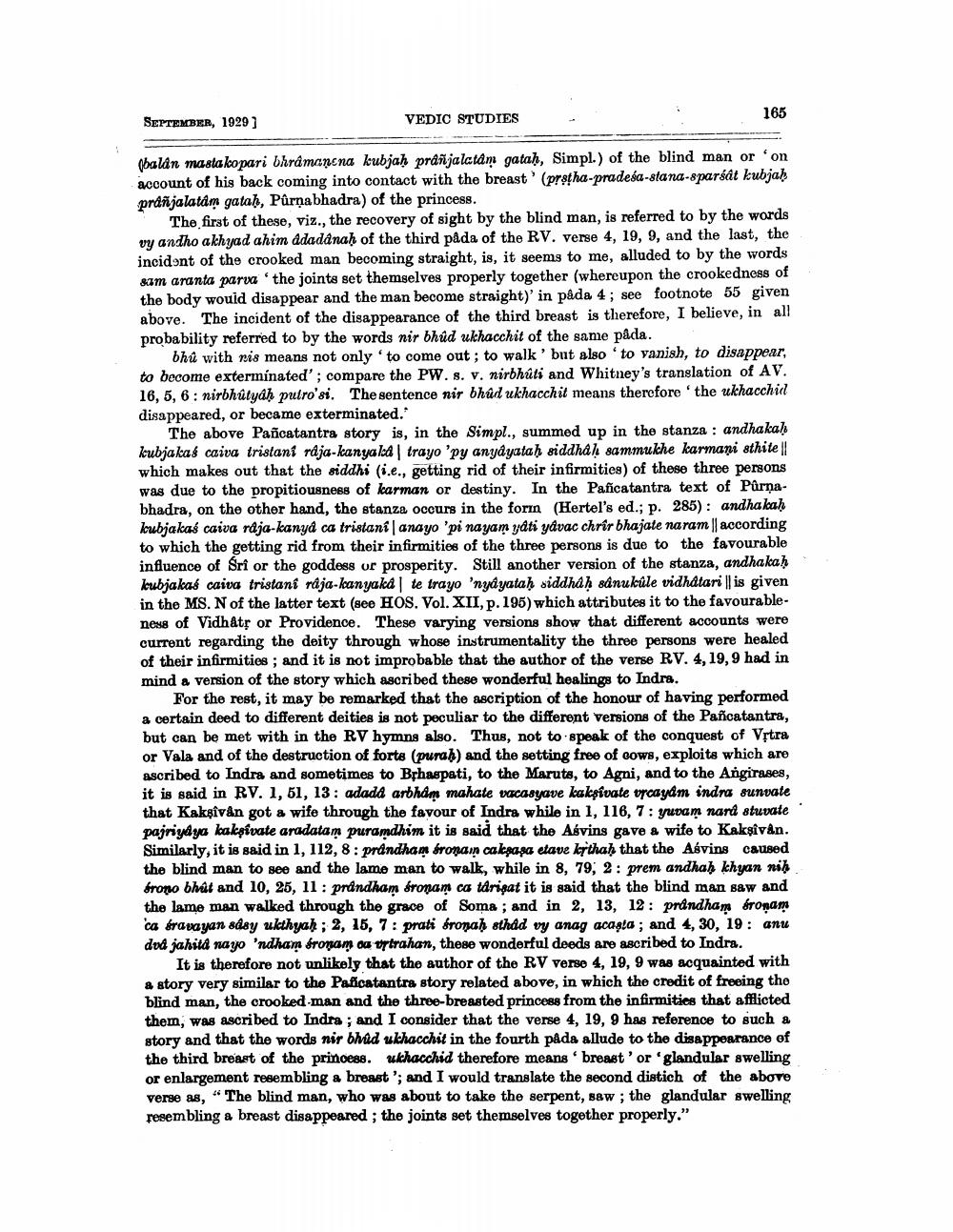________________
SEPTEMBER, 1929)
VEDIC STUDIES
165
Joalan masla ko pari bhramanena lubjah prañjalctam gatah, Simpl.) of the blind man or 'on account of his back coming into contact with the breast' (pratha-pradesa-stana-sparsat kubjah prdnjalatam gatah, Purnabhadra) of the princess.
The first of these, viz., the recovery of sight by the blind man, is referred to by the words vy andho akhyad ahim adadanah of the third pada of the RV. verse 4, 19, 9, and the last, the incident of the crooked man becoming straight, is, it seems to me, alluded to by the words sam aranta parva 'the joints set themselves properly together (whereupon the crookedness of the body wouid disappear and the man become straight)'in pada 4 ; see footnote 55 given above. The incident of the disappearance of the third breast is therefore, I believe, in all probability referred to by the words nir bhúd ukhacchit of the same påda.
bhủ with nis means not only to come out; to walk' but also to vanish, to disappear, to become exterminated'; compare the PW. 8. v. nirbhúti and Whitney's translation of AV. 16, 5, 6: nirbhútyah putro'si. The sentence nir bhůd ukhacchit means therefore the ukhacchiel disappeared, or became exterminated."
The above Pañcatantra story is, in the Simpl., summed up in the stanza : andhaka) kubjakaś caiva tristani rdja-kanyalod trayo'py anyâyatah siddhal sammukhe karmani sthite ! which makes out that the siddhi (i.e., getting rid of their infirmities) of these three persons was due to the propitiousness of karman or destiny. In the Pascatantra text of Parnabhadra, on the other hand, the stanza occurs in the form (Hertel's ed.; p. 285): andhakah kubjakaś caiva rdja-kanyd ca tristani anayo 'pi nayam yati yavac chrir bhajate naram || according to which the getting rid from their infirmities of the three persons is due to the favourable influence of Sri or the goddess or prosperity. Still another version of the stanza, andhakah loubjakaś caiva tristani raja-kanyaka te trayo 'nya yatah siddhah sdnukûle vidhatari | is given in the MS. N of the latter text (see HOS. Vol. XII, p. 195) which attributes it to the favourableness of Vidhats or Providence. These varying versions show that different accounts were current regarding the deity through whose instrumentality the three persons were healed of their infirmities, and it is not improbable that the author of the verse RV. 4, 19,9 had in mind a version of the story which ascribed these wonderful healings to Indra.
For the rest, it may be remarked that the ascription of the honour of having performed a certain deed to different deities is not peculiar to the different versions of the Pancatantra, but can be met with in the RV hymns also. Thus, not to speak of the conquest of Vftra or Vala and of the destruction of forte (purah) and the setting free of cows, exploits which are ascribed to Indra and sometimes to Bphaspati, to the Maruts, to Agni, and to the Angirases, it is said in RV. 1, 51, 13: adada arbham mahate vacasyave kakpivate urcayam indra runvate that Kaksivan got a wife through the favour of Indra whilo in l, 116, 7: yuvam nani stuvate pairiydya kaksivate aradatam puramdhim it is said that the Abvins gave a wife to Kaksivån. Similarly, it is said in 1, 112, 8: prdndham froņain cakpaşa etave krthah that the Asvins caused the blind man to see and the lame man to walk, while in 8, 79, 2: prem andhah khyan nih frono bhit and 10, 25, 11: prandham Gronam ca tdrigat it is said that the blind man saw and the lame man walked through the grace of Soma ; and in 2, 13, 12: prandhan dronam 'ca kravayan sdsy ukthyah ; 2, 15, 7: prati bronah sthad vy anag acagta ; and 4, 30, 19: anu dud jahitd nayo 'ndham Gronam os vytrahan, these wonderful deeds are ascribed to Indra.
It is therefore not unlikely that the author of the RV verse 4, 19, 9 was acquainted with a story very similar to the Pancatantra story related above, in which the credit of freeing the blind man, the crooked man and the three-breasted princess from the infirmities that afflicted them, was ascribed to Indra ; and I consider that the verse 4, 19, 9 has reference to such a story and that the words nir bhad ukhacchit in the fourth pada allude to the disappearance of the third breast of the prinoess. ukhacchid therefore means breast' or 'glandular swelling or enlargement resembling a breast '; and I would translate the second distich of the above verse as, “The blind man, who was about to take the serpent, s8w; the glandular swelling resembling a breast disappeared; the joints set themselves together properly."




